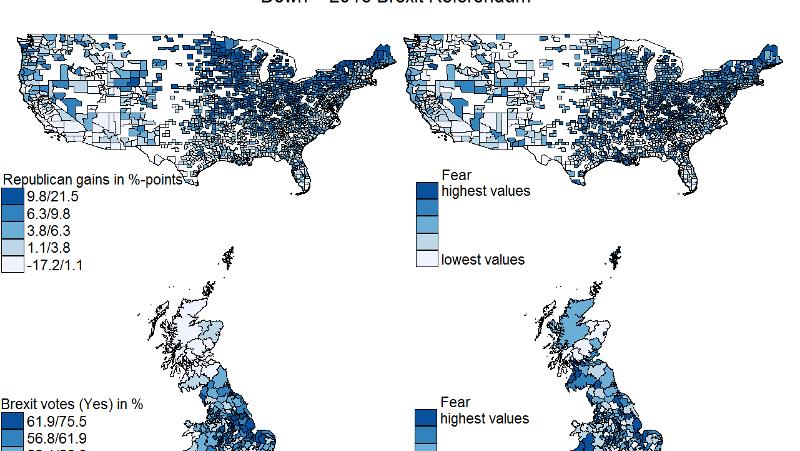
In 2016 voters in the US and the UK defied expert predictions with the Vote Leave campaign winning for the UK to leave the European Union (Brexit) and the election of President Donald Trump. A world-first QUT-led study reveals why.
- Regions with a psychological climate characterised by psychological hardship (e.g., higher regional level in fear- and depression- prone personality) respond to populist political campaigns based on fear
- ‘Irrational’ voting behaviour now shaping global political landscape with the rise of populism evoking and addressing these fears
- Trump and Brexit results dictated by voters suffering economic and psychological hardship
- Campaigns of fear work, especially when waged in former industrial centres now in economic decline
Analysis of big data from millions of UK and US respondents in an online internet personality test shows psychological hardship, which did not shape earlier election results but is now a major factor determining election outcomes associated with a rise in populism, as outlined in research results just published in international journal Social Psychological and Personality Science.
 QUT’s Associate Professor Martin Obschonka from the Australian Centre for Entrepreneurship Research teamed up with researchers from Germany’s Baden Wuerttemberg Cooperative State University and Ilmenau University of Technology, the University of Cambridge, the London School of Economics and Political Science, University of Texas, and the University of Melbourne.
QUT’s Associate Professor Martin Obschonka from the Australian Centre for Entrepreneurship Research teamed up with researchers from Germany’s Baden Wuerttemberg Cooperative State University and Ilmenau University of Technology, the University of Cambridge, the London School of Economics and Political Science, University of Texas, and the University of Melbourne.
The outcome is their paper – Fear, populism, and the geopolitical landscape: The ‘sleeper effect’ of neurotic personality traits on regional voting behaviour in the 2016 Brexit and Trump votes.
“Both campaigns traded on themes of fear, lost pride and loss aversion which tap into fear-prone personalities; a construct not previous associated with the behaviour of voters,” Professor Obschonka said.
“Typically experts agree that is was economic hardship and some form of ‘protest’ that lead many people to vote for Trump and Brexit. However, our study adds a new perspective in showing the link to regional fear-based personalities which also fits with recent observations about the global rise of populism.
“If this is true then one would expect populist campaigns and themes, playing with, and evoking, fears of regional populations, to be particularly successful in regions higher in a fear-prone personality. This is exactly what we found in both the UK and the United States.
“Our study reveals how psychological hardship is now shaping the global political landscape. One could also call this an ‘irrational’ voting behavior as it was not predictable by means of rational models.”
Professor Obschonka said neurotic personality traits included anxiety and depression and these traits are playing a greater role in voting than more positive personality attributes such as openness and conscientiousness.
“So the campaigns of fear worked. Our analysis provides support for the widespread account of the appeal of the populist messages promoted by the Brexit and Trump camps,” Professor Obschonka said.
“The research also indicated clear support for Brexit and Trump in old industrial centres showing ongoing economic decline.
“The role of regional fear, depression, and neuroticism in predicting which way voters will swing has not been identified before and may well have been a latent factor lying dormant until the right conditions prevailed.
“In summary, fear, depression, and neuroticism appear to exert a ‘sleeper effect’ with the potential to have a profound impact on the global political landscape, especially in an era in which we are seeing a rise in nationalism and fear of others worldwide.”
Research statistics summary
US:
The top 50 scoring counties in the personality characteristic fear/anxiety showed, on average, a +9% increase in Trump votes compared to the 2012 Presidential election votes for Republican candidate Mitt Romney in these regions.
The 50 lowest scoring counties in the personality characteristic fear/anxiety showed, on average, a +2% increase Trump votes compared to the 2012 Presidential election votes for Mitt Romney.
UK:
The top 50 scoring Local Authority Districts (UK) in the personality characteristic fear/anxiety showed, on average, 60% yes-votes for Brexit in the 2016 Brexit Referendum.
The 50 lowest scoring Local Authority Districts (UK) in the personality characteristic fear/anxiety showed, on average, 46% yes-votes for Brexit in the 2016 Brexit Referendum.
View the full paper online.
Media contact:
Amanda Weaver, QUT Media, 07 3138 3151, amanda.weaver@qut.edu.au
After hours: Rose Trapnell, 0407 585 901, media@qut.edu.au


